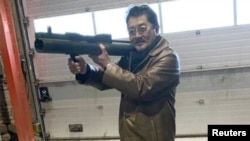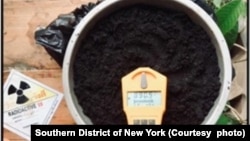Allegations of a Myanmar-Yakuza arms deal involving nuclear materials have raised alarms in Myanmar’s rebel-held Shan state and confounded scientists, who have long been aware of raw uranium in the region but say they have no idea how it could have been processed to weapons-grade material in the remote area.
Last month, U.S. prosecutors announced charges against Takeshi Ebisawa, an alleged member of the Japanese crime syndicate known as the Yakuza, accusing him of conspiring to traffic in nuclear materials.
Ebisawa, currently held in a Brooklyn jail, is alleged to have conspired with a Burmese counterpart, General Yawd Serk of the Shan State Army, or SSA, to export and sell uranium and weapons-grade plutonium to Iran. Serk represents the SSA’s political arm, the Restoration Council for Shan State, or RCSS, which is closely allied with Myanmar’s ruling junta.
According to the U.S. Justice Department charging document, Ebisawa was offering to provide military-quality arms not only to the Shan State Army but also to the Karen National Union, an armed faction representing another ethnic group in Myanmar.
VOA reached out to a spokesperson for the U.S. Attorney's Office, Southern District of New York, who declined to comment on the reliability of the evidence beyond what was stated in the public report. Ebisawa’s lawyer, Evan Lipton, did not respond to inquiries made by VOA.
Weapons-for-uranium exchange
Court documents allege that on September 12, 2020, Ebisawa sought to acquire the nuclear materials in exchange for a large quantity of arms, including surface-to-air missiles destined for the Shan State Army and RCSS.
In a meeting in Thailand accompanied by several unindicted associates, he allegedly offered samples of the nuclear materials to the agents, who were posing as arms and drug traffickers who would in turn sell the materials to an Iranian general.
The nuclear samples, sourced from Myanmar, were seized by Thai authorities and subsequently handed over to U.S. investigators. Laboratory analysis in the United States confirmed the presence of uranium and weapons-grade plutonium in the material, the charging documents say.
The alleged communications with the DEA agent began in February 2020, the documents show. In September of that year, he allegedly emailed the undercover DEA agent a letter offering to sell 50 tons of uranium and thorium for $6.85 million.
Prosecutors assert that Ebisawa also offered to procure significant quantities of military-grade weapons on behalf of an unspecified rebel group in Myanmar. The weapons sought included surface-to-air missiles, assault and sniper rifles, machine guns, rockets of various calibers, and tactical gear.
Rebel leaders deny accusations of arms trading
Spokespersons for the RCSS and the Karen National Union have vehemently denied any involvement in a weapons-for-uranium deal.
In a phone interview with VOA, KNU spokesperson Phado Saw Tawni dismissed the allegations, stating, "KNU never gets involved in that kind of weapons trading, and has no knowledge about Yakuza."
RCSS chairman Yawd Serk, responding to Taifreedom, a Shan State media outlet, dismissed the allegations as "an act of discredit without any source," drawing parallels to previous accusations that he was involved in the drug trade.
In the statement to Taifreedom, Serk said that a few years ago, a foreigner had expressed interest in buying uranium purportedly available in the region. He said he told the foreigner he had never heard of uranium being produced in Shan State. It is unknown whether the foreigner was Ebisawa.
Uranium in Shan State, possible Chinese involvement
In an interview with VOA, a Burmese experimental materials scientist, opting for anonymity for security reasons, provided an eyewitness statement about her experience in Shan State in the mid-2010s.
“I was traveling around Myanmar for my work researching minerals in various mines,” she recounted. “When I went to Shan State, I noticed unusual mining activity. The mountain top was being removed, and the soil was being moved to another location with large machinery,” the scientist said.
“The mining was unlike the kind typically seen in Myanmar, and the activity was seemingly being carried out in secret,” she said. “I saw many Chinese workers, and the area was heavily guarded.”
With the recent news about uranium in Myanmar, the scene stood out to the scientist as possibly being connected. Indeed, the existence of uranium in Shan state has been known since the 1950s, but it is unclear whether the resource has been successfully mined in the years since.
During a recent interview with VOA by phone, Sai Merng, editor-in-chief of Shan Herald Agency for News (SHAN), shared his views about the possibility of uranium mining in Myanmar.
“I noticed many Chinese nationals in Shan state around the mid-2010s,” he said. “They didn’t speak Burmese or Shan. When I asked around about what they were doing there, the local villagers told me they were looking for minerals in the ground.”
Sai Merng pointed out at the time that other mines extracting coal and other resources had been shut down because of environmental concerns. This leads him to believe that the Chinese were looking for something else underground.
“I can’t say for sure whether it was uranium they were looking for, but the evidence seems to point to that,” Merng said.
He said he based his suspicions on the unusual mining methods being used, the secretive nature of the activity, the presence of numerous Chinese workers and the heightened security in the area.
Nuclear reactors and recruitment of experts
“Mining for raw uranium is one thing,” the scientist noted, “but processing it into usable nuclear material is something very different.”
Such operations require sophisticated machinery and a level of expertise not believed to be present in rebel-held rural Myanmar.
“In addition, processing nuclear materials requires a nuclear reactor,” she said, adding that it would require the recruitment of possibly hundreds of scientists and other professionals from foreign countries like China and Thailand with expertise in nuclear physics.
Yakuza-Myanmar nuclear issue
Khin Maung Maung, a professor of physics and astronomy at the University of Southern Mississippi, told VOA that plutonium, the material mentioned in Ebisawa's case, is derived from uranium-239 in a complex nuclear reactor process.
“Obtaining plutonium requires advanced facilities, and it cannot be achieved in a laboratory,” he said. “If Myanmar is, indeed, involved, it implies the existence of a nuclear reactor within or near the country's borders, likely with external assistance.”
When asked if a rebel group could have such technology, or if the ruling junta was likely involved, he replied: “If the Burmese army is involved, their activities would likely be more conspicuous. Buying reactors in the current global context [would raise] questions about their intentions and the disposal of resulting nuclear waste.
“Plutonium production requires a reactor, and based on science, that's the only plausible explanation,” Maung emphasized.
“It's immensely concerning,” the professor continued. “Weapons-grade nuclear materials, if available on the black market, pose a grave threat. Nations such as Iran might refrain from purchasing such materials, but terrorists or other entities seeking to cause havoc could exploit the opportunity.
“Even without creating a nuclear bomb,” Maung said, “dispersing radioactive materials, known as a dirty bomb, could have catastrophic consequences. The fear lies in the long-term radioactivity rendering affected areas unusable, making it a severe threat to global security.”
Impact on Shan people, political community
SHAN news editor Merng expressed concern about the potential ramifications if the RCSS does have refined nuclear materials.
“The capability to purify nuclear materials to such an extent raises fears about the sophistication of weapons that could be manufactured, if it is true,” he said.
The allegations have rekindled historical fears among the Shan people. Merng drew parallels with past events when accusations of drug-related activities led the Shan leader to resign and surrender his entire army to the then-junta in the face of U.S. accusations of drug trafficking.
“The current situation has heightened fears of a similar outcome, creating apprehension within the Shan political community,” he said.
According to Merng, the idea of producing nuclear material for sale to Iran, or to anyone, is highly unlikely, since it involves high technology.
“The consequences of such allegations can be tremendous, even if untrue,” Merng said.
“It could even force the RCSS leader to surrender to the junta military, like Khun Sa's Mong Tai Army, which was then accused of being a drug kingpin. Many Shan people are alarmed by these U.S. Justice Department allegations because of this history.”





